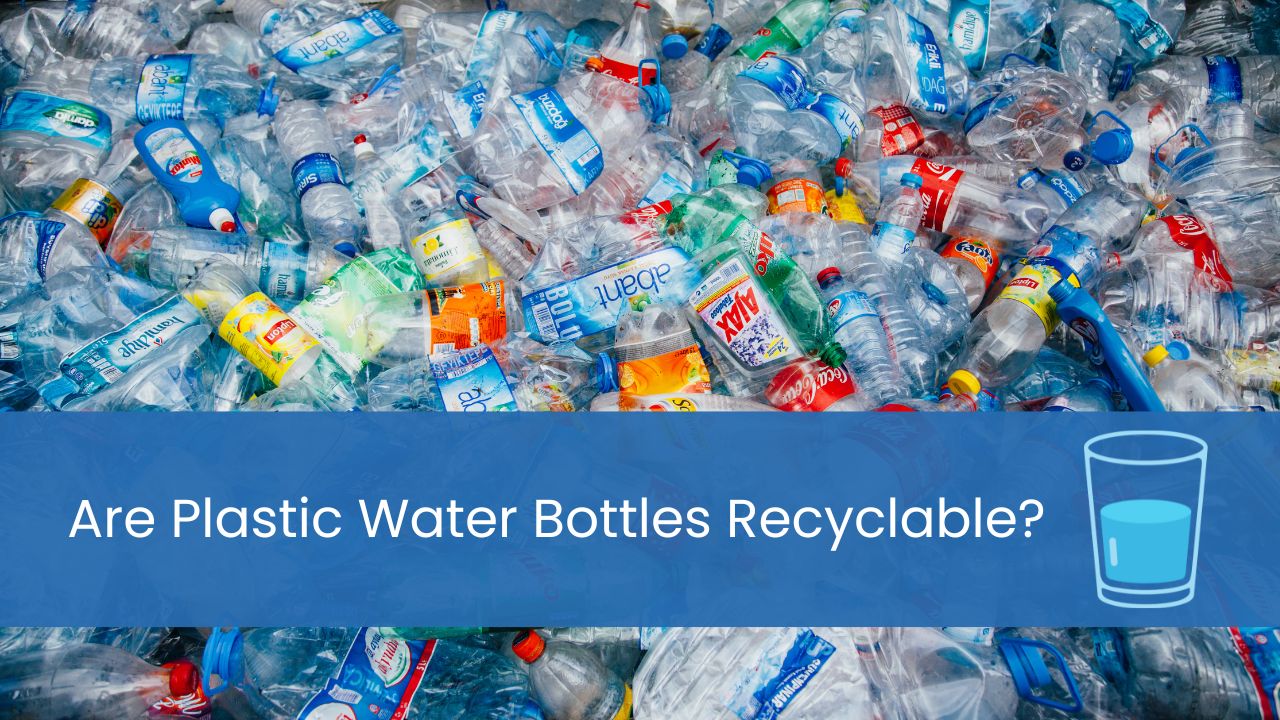Do you ever wonder what happens to the plastic water bottles you use and discard? Are they recyclable or do they end up in landfills, taking hundreds of years to decompose?
The answer is yes, plastic water bottles are recyclable. However, not all recycling programs accept them. In this article, we will explore whether plastic water bottles can be recycled, how to recycle them properly, and what happens to them after they are collected.
You might think that simply tossing your empty water bottle into a recycling bin is enough to ensure it gets recycled. But did you know that improperly recycling a single bottle can contaminate an entire batch of recyclables? That’s why it’s important to know exactly how and where to recycle your plastic water bottles.
Not only does proper recycling help keep our planet clean and reduce waste in landfills, but it also saves energy by reducing the need for virgin materials in new products. So let’s dive into the world of plastic water bottle recycling and learn more about how you can do your part in protecting our environment.
Key Takeaways
- Plastic water bottles are often recyclable, but not all recycling programs accept them.
- Properly recycling plastic water bottles helps reduce waste, conserve resources, save energy, and reduce greenhouse gas emissions.
- PET plastic, commonly used for water bottles, is highly recyclable and can be turned into new products like clothing fibers, carpeting, and more water bottles.
- When recycling plastic water bottles, be sure to empty and rinse them out, remove any non-recyclable caps or labels, and check with local recycling guidelines for specific instructions.
Table of Contents
- Key Takeaways
- Are Water Bottles Recyclable?
- How To Recycle Plastic Water Bottles
- Can You Crush Water bottles For Recycling?
- Where To Recycle Water Bottles
- How Are Water Bottles Recycled?
- How Many Plastic Water Bottles Are Recycled Each Year?
- What Can Water Bottles Be Recycled Into?
- Are Water Bottle Lids Recyclable?
- Conclusion
Are Water Bottles Recyclable?
Yes, plastic water bottles are totally recyclable.
Most plastic water bottles are made from PET, which stands for polyethylene terephthalate. This type of plastic is highly recyclable and can be collected in your recycling bin at home or taken to a local recycling center.
When it comes to recycling PET bottles, there are a few things to keep in mind. First, make sure the bottle is empty and dry before placing it in the recycling bin. Any leftover liquid or moisture can contaminate other materials in the bin and cause them to become non-recyclable.
Additionally, check with your local recycling center to see if they have specific guidelines for PET recycling. Some centers may require you to remove the bottle cap or label before recycling, while others may accept them as-is.
By properly disposing of your plastic water bottles through PET recycling, you’re helping reduce waste and conserve resources for future generations.
How To Recycle Plastic Water Bottles
You can easily give those containers another purpose by transforming them into something new and useful. First, check if your plastic water bottle is made of PET plastic, which is a widely recyclable material. Look for the recycle symbol on the bottom of the bottle to determine its type of plastic.
Once you confirm that it’s PET, rinse out any remaining liquid and remove any labels or caps before recycling. In some areas like California, recycling programs may not accept certain types of plastics due to their low demand for recycled materials.
In this case, consider repurposing the bottles into DIY projects like planters or storage containers instead of tossing them in with regular plastic waste. By finding creative ways to reuse these bottles instead of throwing them away, we can help reduce our impact on the environment and contribute to a more sustainable future.
Can You Crush Water bottles For Recycling?
Crushing your empty PET containers before recycling them may not actually save space in the recycling bin, as some people believe. Here are a few reasons why:
- The size of the container matters more than its shape. When you crush a bottle, it may be smaller in volume but it takes up more space because it becomes flatter and wider.
- Crushing can make it harder to sort materials at the recycling facility. If the plastic is too flattened or distorted, machines may not be able to recognize what type of plastic it is (such as PET plastic) which means it won’t get recycled properly.
- Certain states like California require that all bottles have the recycle symbol on them for proper sorting and processing. When you crush a bottle, this symbol can become distorted or even disappear altogether making it difficult for recyclers to identify.
- Lastly, crushing bottles doesn’t really affect their ability to be recycled into new products made from recycled materials like mineral water bottles and other items we use every day!
So next time you’re thinking about crushing your water bottle before tossing it in the recycling bin, consider these points and throw it in there whole instead!
Where To Recycle Water Bottles
If you’re wondering where to recycle your water bottles, there are plenty of options available near you. You can start by checking with your local waste management company for recycling drop-off locations.
Many grocery stores and retailers also offer bottle return programs where you can redeem your bottles for cash or store credit.
Finding Water Bottle Recycling Near You
Looking for water bottle recycling? Check out your local recycling center or use an online search tool to find a convenient drop-off location near you. Recycling centers are equipped with the necessary facilities and equipment to sort, clean, and process PET plastic bottles. These centers are also responsible for ensuring that these bottles are recycled into new products and not sent to waste.
If you’re in California, make sure to check out CalRecycle’s website for a comprehensive list of certified recycling centers in your area. You can also use online search tools such as Earth911 or Recycle Nation to find drop-off locations near you.
When dropping off your bottles, make sure they have the recycle symbol on them and are properly cleaned before disposal. By doing so, you help ensure that these materials will be recycled into new products instead of adding more waste to our environment.
Together, we can make a difference by properly disposing of our plastic water bottles and turning them into useful recycled materials.
How Are Water Bottles Recycled?
You can easily turn your used plastic water bottle into something new with the help of recycling facilities, which give it a second life like a phoenix rising from the ashes.
The process starts with sorting the bottles and separating them based on their type. PET plastic, which is commonly used for water bottles, is separated from other types of plastics such as high-density polyethylene (HDPE).
Once sorted, the PET bottles are washed and shredded into small flakes that are then melted down to create new products such as clothing fibers, carpeting, and even more water bottles.
Recycling centers in California have made significant progress in reducing waste by promoting recycling programs that encourage people to recycle their plastic water bottles.
When looking at your next bottle of water or any plastic product, make sure you check for the recycle symbol so that it can be properly sorted and recycled instead of ending up in a landfill.
How Many Plastic Water Bottles Are Recycled Each Year?
Every year, countless used water bottles are given a new life through the process of recycling. In California alone, millions of plastic water bottles are recycled each year. This is a significant number when considering that these bottles would otherwise end up in landfills and contribute to waste.
Pet plastic, which is commonly used for water bottles, can be melted down and turned into other products such as carpet fibers or even clothing. Additionally, another type of plastic called high-density polyethylene (HDPE) is also often used for water bottles and can be recycled into items like playground equipment or outdoor furniture.
Recycling plastic water bottles not only benefits the environment by reducing waste but also promotes an eco-friendly lifestyle. By making small changes in our daily routines such as properly disposing of our plastic waste, we can make a positive impact on the world around us.
What Can Water Bottles Be Recycled Into?
One can transform used water bottles into various products, such as carpet fibers and outdoor furniture. Recycling water bottles is not only good for the environment, but it also helps to conserve resources.
When plastic water bottles are recycled, they are melted down and turned into small pellets that can be used to make a variety of new products. These pellets can be transformed into all sorts of things, from clothing to tote bags.
Some companies even use recycled plastic to make park benches, playground equipment, and other outdoor furnishings. By recycling your water bottles instead of throwing them away, you’re helping to reduce waste and keep our planet clean and healthy for future generations.
So next time you finish off a bottle of water, remember that it could go on to have a second life as something else entirely!
Are Water Bottle Lids Recyclable?
Now that you know what water bottles can be recycled into, let’s talk about the lids. Are they recyclable too? The answer is both yes and no, depending on the material.
Firstly, it’s important to check with your local recycling program as different areas may have different guidelines. In general though, plastic bottle caps made from materials like polyethylene (PE) and polypropylene (PP) are usually accepted for recycling. However, caps made from other materials like polystyrene (PS), polyvinyl chloride (PVC), or metal are not as commonly recycled.
Here are some things to keep in mind when it comes to recycling water bottle lids:
- Check with your local recycling program first
- Separate the lid from the bottle before placing them in the recycle bin
- If a cap is not recyclable in your area, consider reusing it or properly disposing of it in the trash
- Make sure to empty and rinse out any remaining liquid before recycling
- Don’t flatten the bottle or cap before putting them in the bin
By following these tips, you can ensure that you’re doing your part to properly recycle plastic water bottles and their accompanying lids. Remember that every little bit helps when it comes to protecting our planet!
Conclusion
Congratulations! You’ve learned all about the recyclability of plastic water bottles.
Remember, to recycle your bottles properly, check with your local recycling center for guidelines on what types of plastics they accept. Crushing your bottles before recycling can save space and energy during transportation.
But don’t stop there! Keep in mind that water bottle lids are also recyclable.
And when you recycle your plastic bottles, you’re helping reduce the number of these pesky pollutants in our environment.
So let’s continue to be mindful and responsible with our waste management practices – every little bit helps create a healthier planet!

Audrey McGill
About The AuthorMeet Audrey, the water-enthusiast behind WeLikeWater.com. Her love for all things H2O inspired her to create this laid-back space where folks can dive into the world of water. From the fizzy to the calm, Audrey's been on a journey through every ripple and wave, and she's eager to share her discoveries.

